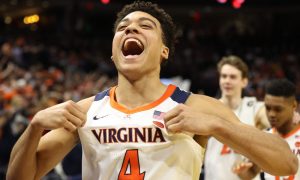In the wake of legalization, Virginia legislators have presented a draft of the sports betting regulations for public comment. There has been a significant rebuttal from online sports betting platforms such as FanDuel and DraftKings. The companies see some of the proposed regulations as untenable and unrealistic in the current sports betting climate.
In early 2020 the Virginia Legislature legalized sports betting within the  state (HB 896). The bill empowered the Virginia Lottery to approve no more than twelve sports betting licenses to both brick and mortar locations like Colonial Downs and online based platforms such as DraftKings. In a review done by the Joint Legislative Audit and Review Commission on the profitability of online sports wagering, the commission estimated that tax revenue could be as high as $55 million per year.
state (HB 896). The bill empowered the Virginia Lottery to approve no more than twelve sports betting licenses to both brick and mortar locations like Colonial Downs and online based platforms such as DraftKings. In a review done by the Joint Legislative Audit and Review Commission on the profitability of online sports wagering, the commission estimated that tax revenue could be as high as $55 million per year.
The purposed regulations have now entered the public review phase. This period will determine how quickly legal sports betting is introduced to the state. But it will also shape the form that sports gambling takes in Virginia and several operators have expressed their concerns.
Advertising to Consumers
Under the current draft of the regulations, platform operators will be required to submit their advertising materials to the state lottery for prior approval. Marketing and promotional material will also need to be approved before platforms can deliver it to consumers. The aim is to prohibit sports betting platforms from branding content specifically tailored to minors.
The regulations would also prohibit advertising on any media that itself caters to minors. However, they do not specify which platforms specifically fall within the rule. Many sports betting platforms have countered with an offer of prior notice to the lottery rather than formal prior approval.
Penn National Gaming is not alone in seeing this formal ad review requirement as exceedingly burdensome. “By mandating an approval process for all advertising efforts, this will impact the ability to get promotions quickly posted, which is extremely important given the fast-paced nature of sports (e.g. playoff series being extended),” the company wrote in response to the proposed regulations.
The Olympics
Although not included in the legislature’s bill, the regulations include a provision which prohibits sports betting on the Olympics. The bill itself does prohibit betting on college sports games that involve Virginia schools. But the issue of gambling on the Olympics was left up to the Virginia Lottery to determine. Sports betting platforms, such as DraftKings, have expressed significant concern.
Their argument is plainly, to exclude certain sports defeats the purpose of legalizing sports betting. “In order to fully eradicate the illegal market, the legal market must be able to compete, which means including as wide an array of event and betting options for consumers.” DraftKings went on, “the International Olympic Committee is an international sports governing body that ensures integrity across the events it oversees and, as such, the board can be assured events comport with ethical standards.”
Displaying Odds and Handles
The proposed regulations are written to create a so called “Sports Bettors Bill of Rights.” One of those rights would require the various sports betting platforms to display the real time odds of winning a bet including how  those odds were determined, the total amount wagered, and pay out amounts. Operators argue that sports betting odds differ greatly from the mathematical odds in other forms of gambling such as the lottery, card games, or dice based games.
those odds were determined, the total amount wagered, and pay out amounts. Operators argue that sports betting odds differ greatly from the mathematical odds in other forms of gambling such as the lottery, card games, or dice based games.
Top sports betting platforms, such as DraftKings and FanDuel, gave significant pushback. Such regulations would be a first in any U.S. state to make sports gambling legal. “Sports betting apps are simply not built to provide and display this type of information,” wrote FanDuel in response to the proposed regulations. The company offered a recent example of an NBA Playoff game with twenty-four types of bets a customer could place. That gave a gambler more than 300 possible outcomes with an incalculable number of potential parlays. The processing power and screen space needed to display that information in real time could create huge logistical challenges, FanDuel wrote.
“As such, this requirement would force a re-engineering of the products, to create a demonstrably worse user experience, and all to provide information which is immaterial to the calculation of the odds and/or payout a bettor will receive.” FanDuel went on, “the actual odds that the Brooklyn Nets will beat the Toronto Raptors, and by how many points, is unknown.”
Consumer Exclusion Safeguards
The proposed regulations layout a detailed process by which consumers can voluntarily exclude themselves from sports betting if they feel they are becoming addicted and losing excessive amounts of money. The individual can ban themselves for periods of two years, five years, or for life. The self-identified addict would simply need to provide information such as address, date of birth, social security number, and description of their physical appearance. However, platforms have argued that the process is filled with flaws.
If a self-identified addict is found to have gambled on one of the various sports betting platforms, the platform is required to “seize the individual’s winnings and other things of value.” FanDuel responded, “it would be no more appropriate to require permit holders to seize the funds (not ascribable to winnings) in an individual’s account, any more than it would be for a casino operator to seize all the money in a self-excluded individual’s wallet if they were found to have entered the casino.”
The proposed process also requires a self-identified addict to ban themselves by going to the betting apps rather than through the lottery site. In addition, an individual who would like to ban themselves for life would need to appear in person. “This is akin to requiring an individual to enter a casino in order to ban himself from a casino,” said a representative from Caesars Entertainment.
The self-exclusion process would allow an individual to cancel their current bets and receive a refund. This has operators concerned that gamblers could use the process to get out of high-risk bets. Penn National Gaming wrote, “a patron may have a future wager on a team to win the Super Bowl, as soon as they know the team will not make the playoffs, they self-exclude in order to get a refund.”
Upcoming
The public comment period for the proposed regulations ended last week and the Virginia Lottery is scheduled to convene to discuss finalizing the regulations this week. Once the regulations are in place, the Lottery will begin accepting applications for sports betting licenses.